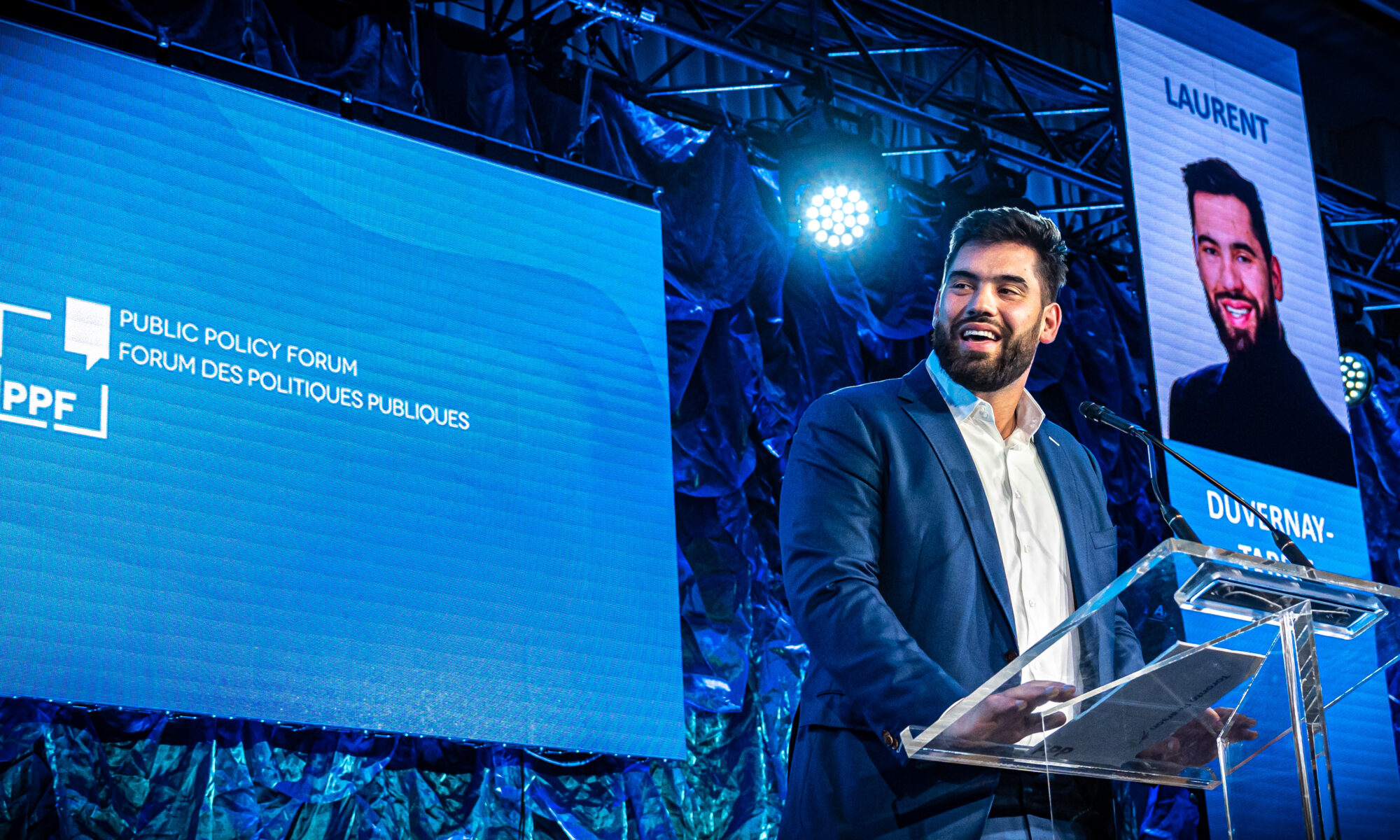
Laurent Duvernay-Tardif, NFL player, doctor, advocate: The road to public health policy

The following is a transcript of an acceptance speech given by Laurent Duvernay-Tardif at the Public Policy Forum’s Testimonial Dinner Awards and Honour Roll on April 27, 2023 in Toronto.
“It is cost effective to invest in primary prevention and improve quality of life of our patients. And, eventually, if we have the political courage to do so, it might reduce the burden of the health-care budget. So, why not do that?”
Good evening. It’s not easy to be the last one to be up on the stage tonight, but it’s for sure an honour. Thank you for having me. We talked a lot about sport tonight, we talked about baseball and hockey. I’m here to talk a little bit about football. The big news is that 48 hours ago, Aaron Rodgers got traded to the Jets. If that’s not a good news, I don’t know what is. But you know what? Objectively, I think sport is pretty simple. When it comes to my sport, the goal is to move a little ball of leather across a patch of grass. But when you look at it from a society standpoint, I think that sport has the ability to bring people together. That’s why we talk so much about sport. It has the ability to connect people regardless of where you’re coming from, socioeconomic background, political view. It brings people together. And that’s unique.
Also see: Laurent Duvernay-Tardif: “My goal is to do good and to help people be healthy”
From the inside, sport is also unique, especially team sport. When you play in Kansas City, actually when you play at McGill University and unfortunately you lose all of your games before getting drafted, you play in front of 500 people and then a couple of months later you’re playing in front of 80,000 and you’re parachuted into a new environment of 95 guys from all over the world, mostly the U.S. but basically all over the world. And everybody’s coming from different backgrounds. And a locker room is kind of a microcosm and we should learn from that because everybody plays with one single vision; sacrifice himself in order for the team to win. And that’s beautiful, I’m telling you, and I think we should learn from that.
By playing football, you also build a platform. You play in front of millions of people on TV. I got a chance to win the Super Bowl; 140 million people were watching from 122 countries. You build a platform, and I think it’s your responsibility as an athlete to use it to promote things that you believe in. For me, my calling is health; it’s health promotion, it’s health inequality, it’s public health. When I got drafted in 2014, I promised myself I was going to finish that M.D. It took me six years and the hardest thing while I was at McGill was to combine both, from a schedule standpoint. And when I got to the NFL, the hardest thing became to transition from one world to the other. You play in front of 80,000 people; you have a whole team of professionals that are there to optimize your performance and then you lose in the playoffs and two weeks later you’re back as the bottom of the food chain of the medical hierarchy and now you’re the medical student. And now you’re part of that team of professionals that are there to optimize the care of the patient. And you’ve got to show empathy, which is not something that you do when you play football. But you learn a lot. And for me, year after year, I transition from football to medicine.
And after winning the Super Bowl, there’s a thing called the pandemic that happened. And the government asked for people to go back and help in long-term care facilities that were really badly hit by COVID. And I was part of a movement of thousands of people that raised their hands – retired nurses and doctors, teachers, physio and rehab therapists. And I went back on the front line in order to treat people. And I went in there with the mindset of a medical student. I was trying to optimize everything, adjusting blood pressure, medication and metformin and that kind of stuff. And, at some point, you realize that those people are not going back home. It’s either COVID or it’s something else. And then you realize the difference between treating and caring for somebody. That’s why medicine is an art; it’s because there is not a single treatment plan for a diagnosis. It’s based on context, on human interaction. And I learned a lot. I learned about the importance of comfort and dignity. And I also learned that our health-care system is really focused on a treatment-based approach and a creative approach. And that’s why I decided to enrol in public health. And I learned through that process – and I’m still at the beginning of that reflection – but I learned how much of an impact we can have with primary prevention. It is cost effective to invest in primary prevention and improve quality of life of our patients. And, eventually, if we have the political courage to do so, it might reduce the burden of the health-care budget. So, why not do that?
So, I don’t know how long football’s going to last; I hope for a few more years. But I know this is just the beginning of my journey. And the same way I saw medicine as a one-on-one interaction with a patient when I first started, I think now I see it more as a way to advocate for health at a population level. And that’s why for me, it’s an honour to get that – I was going to say trophy – but this award. Thank you so much, guys.


